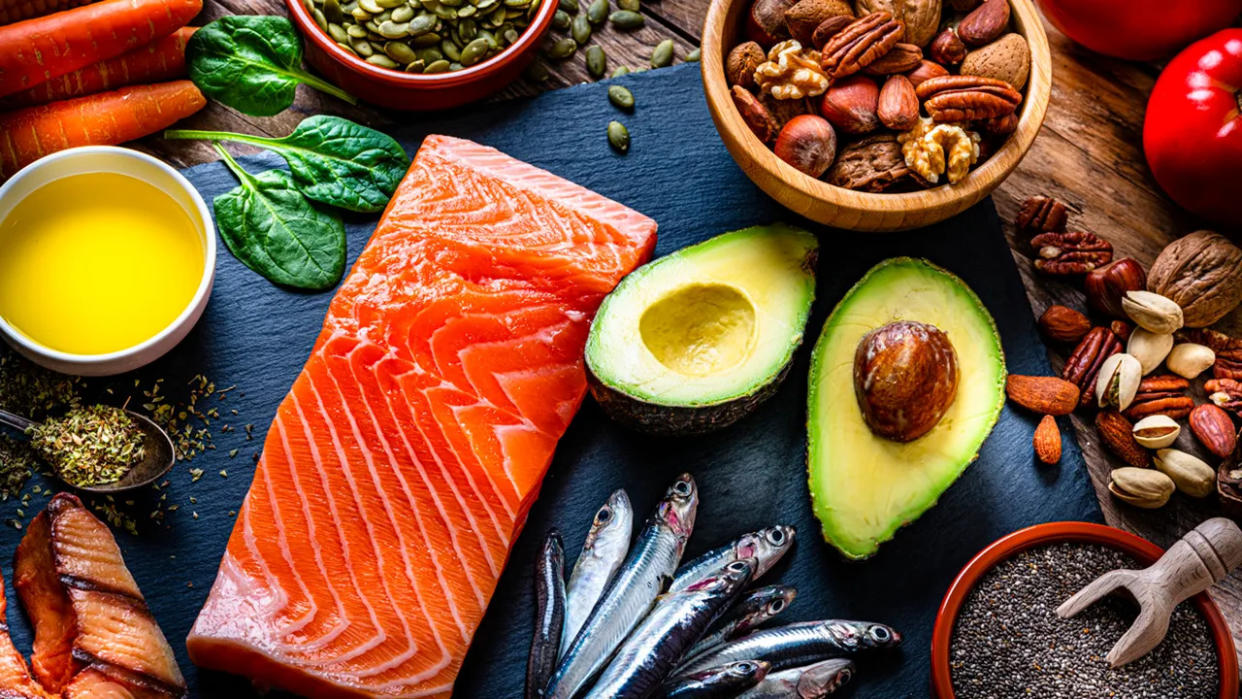6 ‘Eating theories’ are tested as true or false by nutritionists
When it comes to healthy eating concepts, there are all kinds of rules, trends and advice about what’s good for you and what’s not.
Some guidance may be correct – however some of it should be taken with a grain of salt.
Many experts and researchers at Mass. General Brigham in Boston investigated some of the popular diet theories that are circulating – and separated the fact from the myth.
THE NEEDS OF CHILDREN AFTER GOING TO SCHOOL ARE HEALTHY, FUNCTIONAL
Here are six popular theories – and a clear explanation of whether or not they hold water, according to experts.
The truth. In recent studies, the Mediterranean diet has been shown to be beneficial for overall health.
READ ON THE FOX NEWS APP


Mass General supports this theory, citing its own study that found that women who followed a nutritional plan for more than 25 years had a 23% lower risk of death, with a reduction in heart disease and cancer. .
The study also found that adding one portion of food resulted in a 5% reduction in the long-term risk of death from certain diseases.
WHICH COLOR IS ‘NICE’ TO YOU AND WHY: RED, GREEN OR YELLOW?
The Mediterranean diet includes healthy foods such as fruits, vegetables, legumes, olive oil, nuts and fish, while avoiding sugar and processed or red meat.
Many people don’t realize the impact of diet on health and longevity, according to Samia Mora, MD, director of the Lipid Metabolomics Center at Brigham and Women’s Hospital.


“What we eat today has huge implications for living a long and healthy life,” he wrote in a statement to Fox News Digital.
“Good [of the Mediterranean diet] they were seen for cancer and cardiovascular disease – the two leading causes of death in women and men – and are linked to many biological processes, particularly reducing inflammation and insulin resistance and improved metabolism. “
False. Although some people suffer from food allergies or autoimmune conditions, the experts at Mass General have found this diet theory to be largely false – as many digestive symptoms are known to have “causes that more complex.”
PANO’S REPENTANCE VS. JELLY: JEWELS RESPOND TO THE REAL ‘WE’ IN TWO
When patients have bad reactions to certain foods, it’s not the food itself that causes problems, but the digestive response to the food “in general,” according to Kyle Staller, MD, director of the Gastrointestinal Motility Laboratory at the hospital. of Massachusetts General.


“Although some people have true allergies to certain foods (eg, gluten sensitivity in celiac disease) or the inability to digest certain foods (such as lactose intolerance) , many symptoms caused by certain foods are actually driven by your body’s response to eating,” he told Fox News Digital.
Eating initiates “neural activity in the gut” regardless of the type of food eaten, according to Staller.
A WONDERFUL BLOOD OF ORGANS PROVIDES A ‘USEFUL LIFE STORY,’ CAN BE A GOOD WAY TO ENJOY RESPONSES.
Those with irritable bowel syndrome may experience GI distress in the form of gas, bloating and feelings of unusual hunger.
“These are what we call ‘gut-brain dysfunctions’—feelings that aren’t normal even when digestion seems to be working normally,” Staller said.


“Irritable bowel syndrome (IBS) is the oldest example.”
The best way to reduce these symptoms is to target abnormal nervous system responses while eliminating the “worst” foods, according to Staller.
The truth. Researchers have found this to be true: Blueberries can actually be good for your eyes.
IS SALAD ALWAYS A BETTER CHOICE THAN SAND? THINK TWICE ABOUT THAT
A Mass General study of nearly 40,000 US middle-aged and older adults found that one or more servings of blueberries per week was associated with a 28% lower risk of macular degeneration. age-related macular degeneration (AMD), an eye condition that can lead to significant. loss of vision.


Dr. Howard D. Sesso, director of nutrition and supplements research at Brigham and Women’s Hospital, confirmed that blueberries can improve eye health.
“Blueberries contain anthocyanins, which are bioactive polyphenols that give them their blue color, and have been linked to a possible reduction in eye disease,” he told Fox News Digital.
False, with caveats. Mass General experts say that a plant-based diet isn’t always the best way to go, even if it seems to be very healthy.
Plant-based nutrition plans have “various and sometimes contradictory health effects,” according to Dr. Qi Sun, assistant professor of medicine at Brigham and Women’s Hospital.
A plant-based diet with refined grains, sugary drinks and sweets is very different from one with fresh fruits and vegetables, whole grains, coffee, tea and more, he noted.


Early diets are associated with “numerous negative health outcomes,” according to the researchers.
LIVER, COCKROACHES, SARDINES — OH MY!: 8 ‘PERFECT’ FOODS THAT MEDICINE EXPERTS SAY YOU ARE EATING.
The second diet is considered a “healthier version of a plant-based diet,” which Sun said is “strongly associated with beneficial health outcomes, including a reduced risk of developing diseases such as diabetes, obesity and gout.”


In a statement sent to Fox News Digital, Sun urged people to focus on high-quality foods — such as fresh fruit, non-starchy vegetables, whole grains, beans and nuts, olive oil and other vegetable oils. – and cut down on sugar and salt. .
“Don’t forget to do regular things and other healthy choices,” he advised. “Of course, food is not a magic bullet by itself.”
False. Mass General dismissed the idea as a “flat-out lie,” as the “choice architecture” of the grocery store “strongly influences what we buy.”
When healthy items are stored in visible or convenient locations, that increases the likelihood of making the right choice, according to the researchers.


In the Mass General Hospital cafeteria, food and drinks are labeled as red, yellow and green – red being the healthiest and green the healthiest.
CHERRIES ARE A SMALL FRUIT FULL OF MANY MEDICINES AND FREE HEALTH BENEFITS.
The researchers found that when healthy items were in convenient locations or at eye level, workers were more likely to make the right choice.
Anne Thorndike, MD, a primary care physician at Massachusetts General Hospital, shared with Fox News Digital that the opposite is true.


“This is well known by the food industry, which has been placing sugary drinks, salty snacks, sweets and baked goods in checkout lanes, endcaps and at the front of the store,” he said.
The truth. Introducing a young child to foods that are known to cause illness can be scary for parents, but Mass General has confirmed that it can be beneficial in the long run.
For more Health articles, visit www.foxnews/health
Introducing “developmentally appropriate” varieties of peanuts to children between 4 and 6 months of age can lead to an 80% reduction in high-risk peanut allergies, according to the LEAP (Learning Early About Peanut Allergy).


Michael Pistiner, MD, director of Food Allergy Advocacy, Education and Prevention at Mass General Hospital for Children, stressed that these findings show that “time is of the essence.”
“Once the child reaches the pediatrician, it may be too late to prevent an allergy that could have been avoided with early introduction of the allergen and family education,” he told Fox News Digital.
CLICK HERE TO REGISTER FOR OUR LIFESTYLE
Pistiner added, “With limited access to palliative care providers and long wait times of over three months, primary care nurses play an important role in supporting families by infant feeding, allergen exposure, eczema management, and food testing and transmission.”
Source of original article: 6 ‘Eating theories’ are considered true or false by nutritionists
#Eating #theories #tested #true #false #nutritionists
